BUSN200016 - Online Reputation Management Impact on Brand Image Study
VerifiedAdded on 2024/06/28
|20
|4308
|482
Report
AI Summary
This report explores the crucial role of online reputation management (ORM) in shaping a company's brand image. It addresses the problem of neglecting ORM strategies amidst a rapidly changing market environment, highlighting the need for businesses to proactively manage their online presence to attract and retain customers. The report aims to enhance the understanding of ORM, elaborate on factors affecting brand image, and ensure customer attraction. Key research questions focus on identifying factors influencing ORM and strategies for effective management. A literature review provides a theoretical framework, discussing ORM's definition, management processes, and its impact on brand image, emphasizing the importance of communication, customer feedback, and online reviews. The report also outlines a proposed methodology, including research approach, data collection techniques, population sampling, and variable analysis, along with a project budget and timeline.
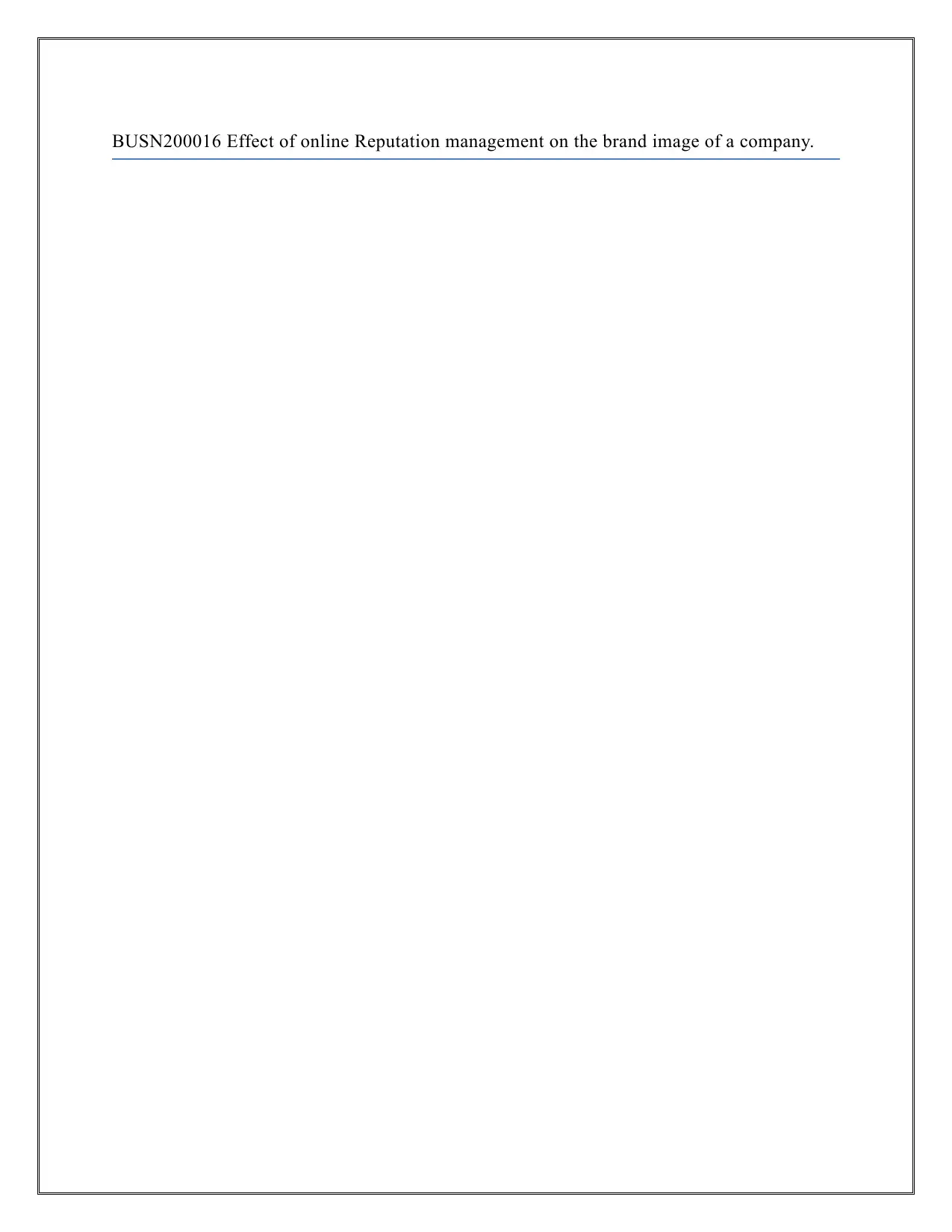
BUSN200016 Effect of online Reputation management on the brand image of a company.
Paraphrase This Document
Need a fresh take? Get an instant paraphrase of this document with our AI Paraphraser
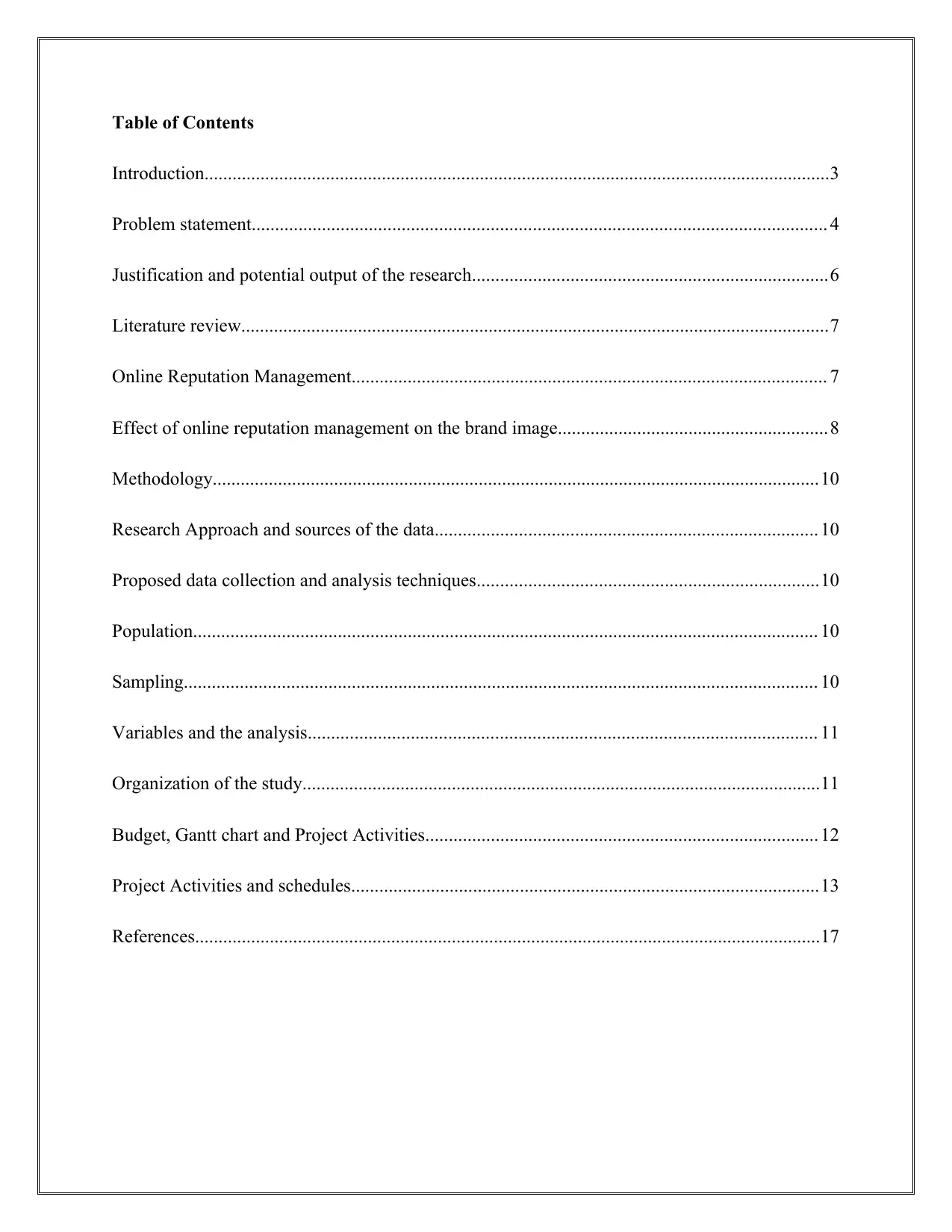
Table of Contents
Introduction......................................................................................................................................3
Problem statement........................................................................................................................... 4
Justification and potential output of the research............................................................................6
Literature review..............................................................................................................................7
Online Reputation Management...................................................................................................... 7
Effect of online reputation management on the brand image..........................................................8
Methodology..................................................................................................................................10
Research Approach and sources of the data.................................................................................. 10
Proposed data collection and analysis techniques.........................................................................10
Population...................................................................................................................................... 10
Sampling........................................................................................................................................ 10
Variables and the analysis............................................................................................................. 11
Organization of the study...............................................................................................................11
Budget, Gantt chart and Project Activities.................................................................................... 12
Project Activities and schedules....................................................................................................13
References......................................................................................................................................17
Introduction......................................................................................................................................3
Problem statement........................................................................................................................... 4
Justification and potential output of the research............................................................................6
Literature review..............................................................................................................................7
Online Reputation Management...................................................................................................... 7
Effect of online reputation management on the brand image..........................................................8
Methodology..................................................................................................................................10
Research Approach and sources of the data.................................................................................. 10
Proposed data collection and analysis techniques.........................................................................10
Population...................................................................................................................................... 10
Sampling........................................................................................................................................ 10
Variables and the analysis............................................................................................................. 11
Organization of the study...............................................................................................................11
Budget, Gantt chart and Project Activities.................................................................................... 12
Project Activities and schedules....................................................................................................13
References......................................................................................................................................17
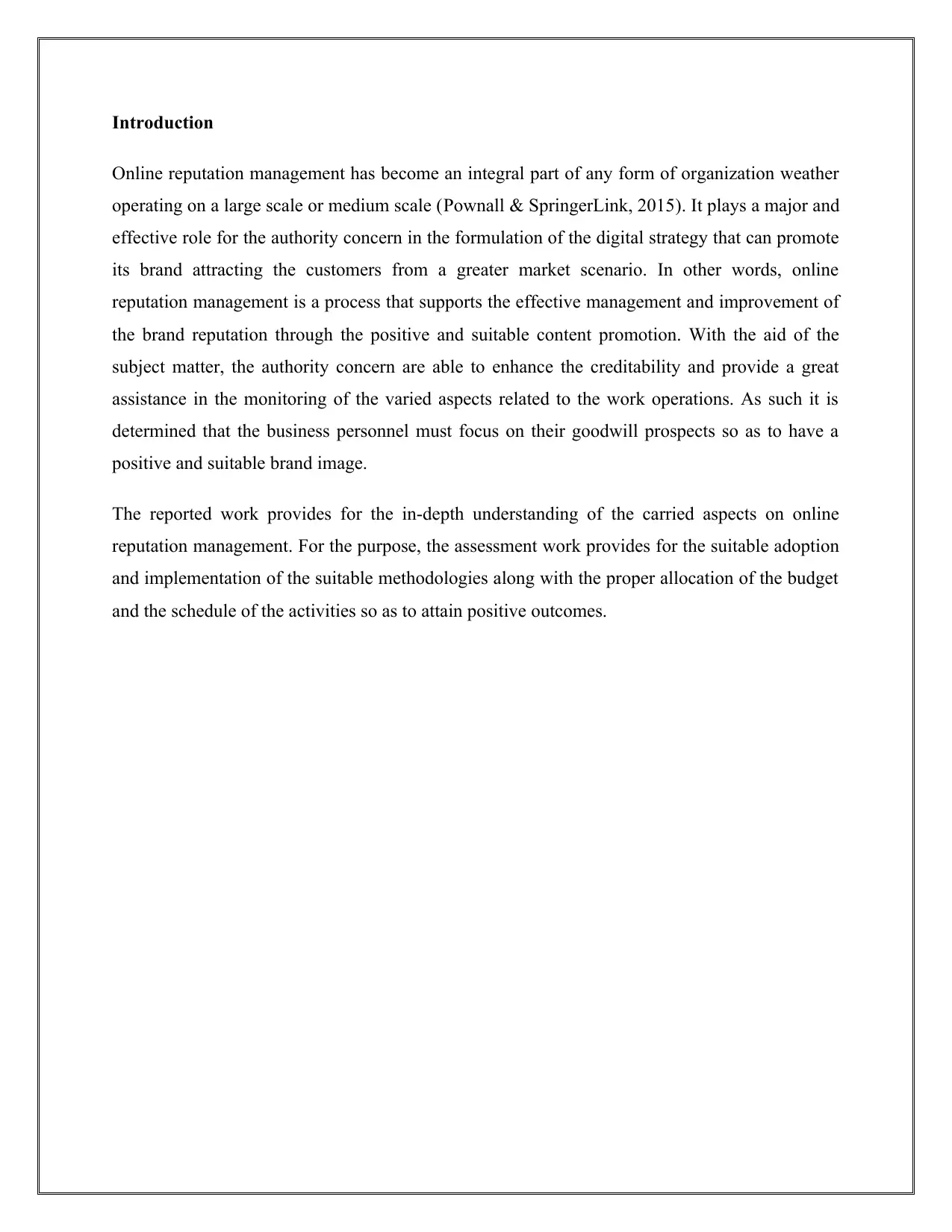
Introduction
Online reputation management has become an integral part of any form of organization weather
operating on a large scale or medium scale (Pownall & SpringerLink, 2015). It plays a major and
effective role for the authority concern in the formulation of the digital strategy that can promote
its brand attracting the customers from a greater market scenario. In other words, online
reputation management is a process that supports the effective management and improvement of
the brand reputation through the positive and suitable content promotion. With the aid of the
subject matter, the authority concern are able to enhance the creditability and provide a great
assistance in the monitoring of the varied aspects related to the work operations. As such it is
determined that the business personnel must focus on their goodwill prospects so as to have a
positive and suitable brand image.
The reported work provides for the in-depth understanding of the carried aspects on online
reputation management. For the purpose, the assessment work provides for the suitable adoption
and implementation of the suitable methodologies along with the proper allocation of the budget
and the schedule of the activities so as to attain positive outcomes.
Online reputation management has become an integral part of any form of organization weather
operating on a large scale or medium scale (Pownall & SpringerLink, 2015). It plays a major and
effective role for the authority concern in the formulation of the digital strategy that can promote
its brand attracting the customers from a greater market scenario. In other words, online
reputation management is a process that supports the effective management and improvement of
the brand reputation through the positive and suitable content promotion. With the aid of the
subject matter, the authority concern are able to enhance the creditability and provide a great
assistance in the monitoring of the varied aspects related to the work operations. As such it is
determined that the business personnel must focus on their goodwill prospects so as to have a
positive and suitable brand image.
The reported work provides for the in-depth understanding of the carried aspects on online
reputation management. For the purpose, the assessment work provides for the suitable adoption
and implementation of the suitable methodologies along with the proper allocation of the budget
and the schedule of the activities so as to attain positive outcomes.
⊘ This is a preview!⊘
Do you want full access?
Subscribe today to unlock all pages.

Trusted by 1+ million students worldwide
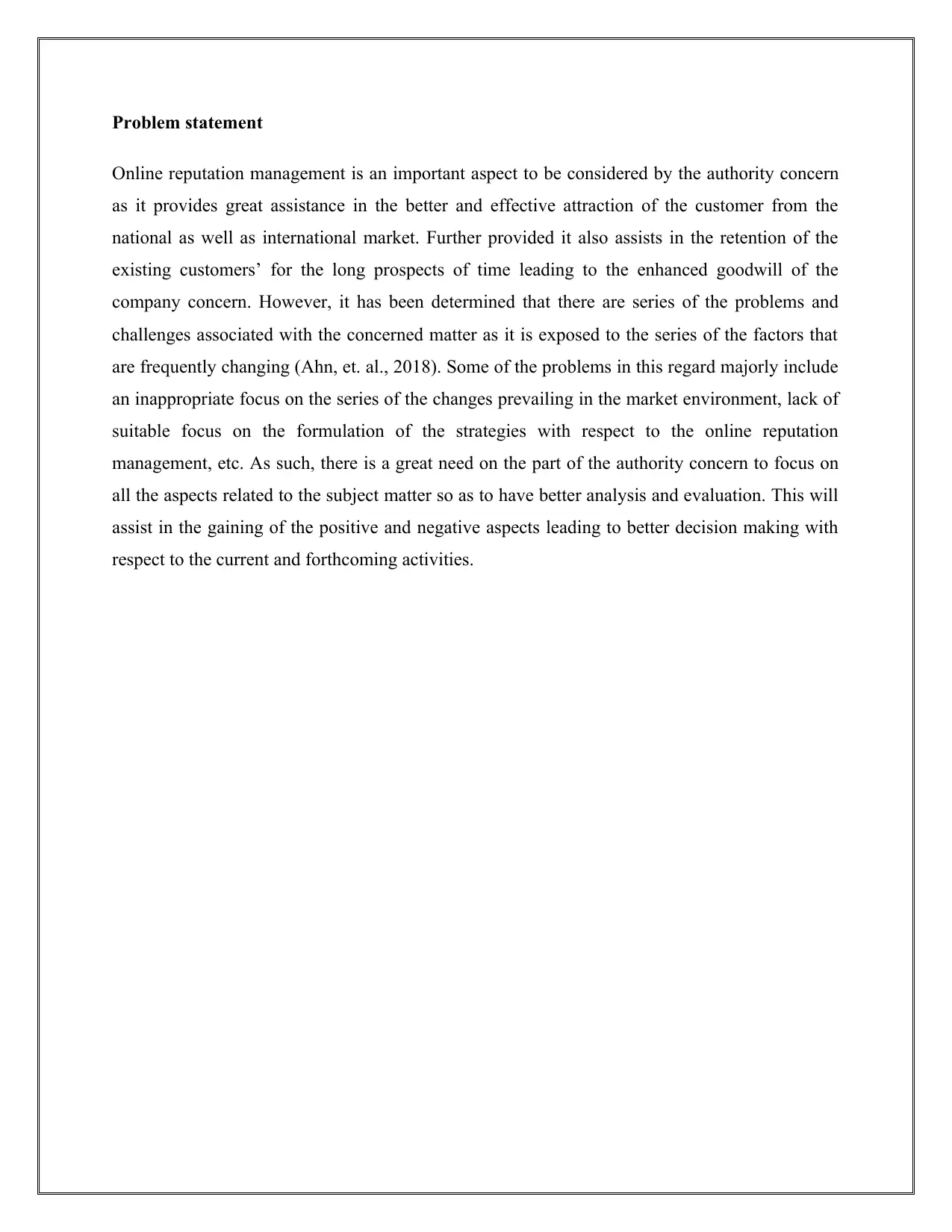
Problem statement
Online reputation management is an important aspect to be considered by the authority concern
as it provides great assistance in the better and effective attraction of the customer from the
national as well as international market. Further provided it also assists in the retention of the
existing customers’ for the long prospects of time leading to the enhanced goodwill of the
company concern. However, it has been determined that there are series of the problems and
challenges associated with the concerned matter as it is exposed to the series of the factors that
are frequently changing (Ahn, et. al., 2018). Some of the problems in this regard majorly include
an inappropriate focus on the series of the changes prevailing in the market environment, lack of
suitable focus on the formulation of the strategies with respect to the online reputation
management, etc. As such, there is a great need on the part of the authority concern to focus on
all the aspects related to the subject matter so as to have better analysis and evaluation. This will
assist in the gaining of the positive and negative aspects leading to better decision making with
respect to the current and forthcoming activities.
Online reputation management is an important aspect to be considered by the authority concern
as it provides great assistance in the better and effective attraction of the customer from the
national as well as international market. Further provided it also assists in the retention of the
existing customers’ for the long prospects of time leading to the enhanced goodwill of the
company concern. However, it has been determined that there are series of the problems and
challenges associated with the concerned matter as it is exposed to the series of the factors that
are frequently changing (Ahn, et. al., 2018). Some of the problems in this regard majorly include
an inappropriate focus on the series of the changes prevailing in the market environment, lack of
suitable focus on the formulation of the strategies with respect to the online reputation
management, etc. As such, there is a great need on the part of the authority concern to focus on
all the aspects related to the subject matter so as to have better analysis and evaluation. This will
assist in the gaining of the positive and negative aspects leading to better decision making with
respect to the current and forthcoming activities.
Paraphrase This Document
Need a fresh take? Get an instant paraphrase of this document with our AI Paraphraser
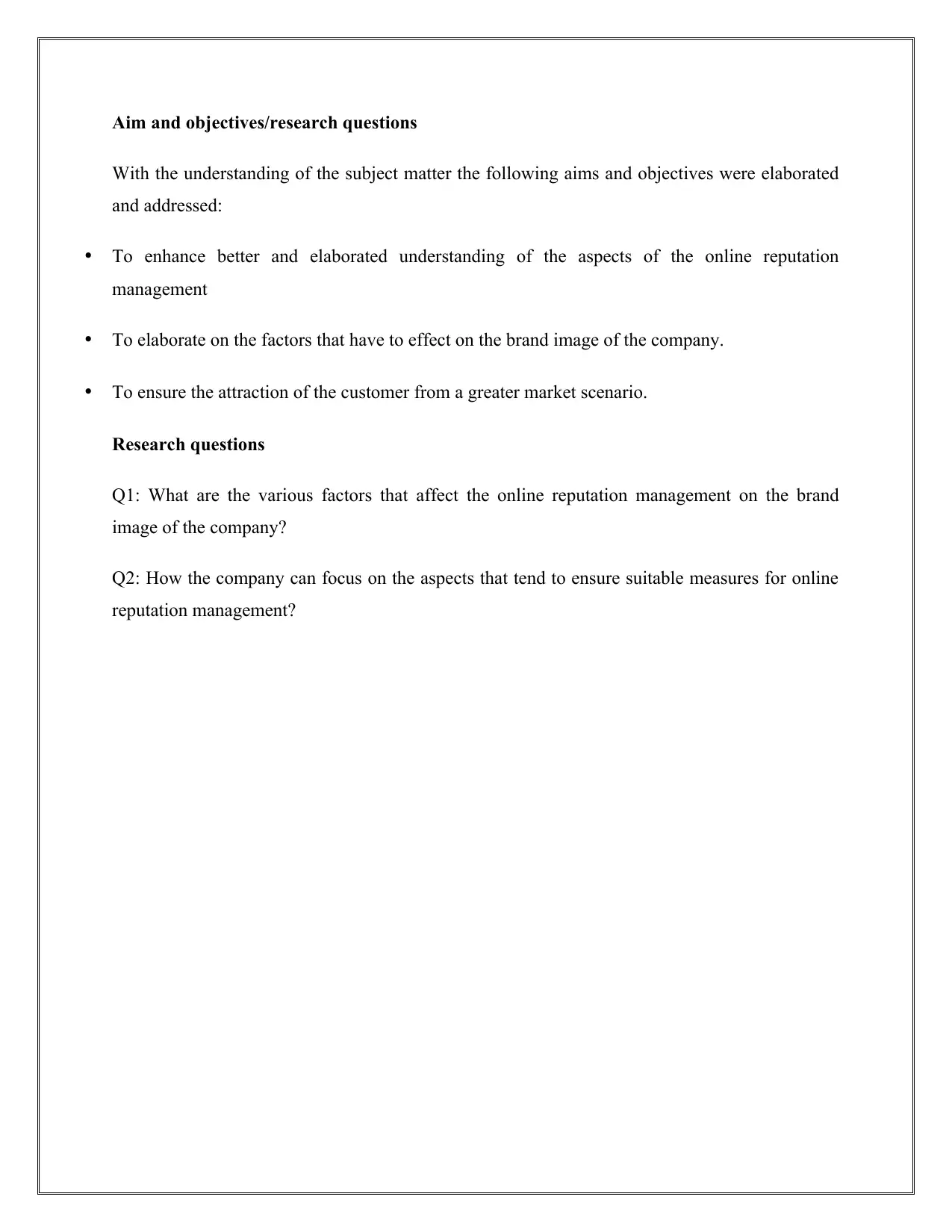
Aim and objectives/research questions
With the understanding of the subject matter the following aims and objectives were elaborated
and addressed:
To enhance better and elaborated understanding of the aspects of the online reputation
management
To elaborate on the factors that have to effect on the brand image of the company.
To ensure the attraction of the customer from a greater market scenario.
Research questions
Q1: What are the various factors that affect the online reputation management on the brand
image of the company?
Q2: How the company can focus on the aspects that tend to ensure suitable measures for online
reputation management?
With the understanding of the subject matter the following aims and objectives were elaborated
and addressed:
To enhance better and elaborated understanding of the aspects of the online reputation
management
To elaborate on the factors that have to effect on the brand image of the company.
To ensure the attraction of the customer from a greater market scenario.
Research questions
Q1: What are the various factors that affect the online reputation management on the brand
image of the company?
Q2: How the company can focus on the aspects that tend to ensure suitable measures for online
reputation management?
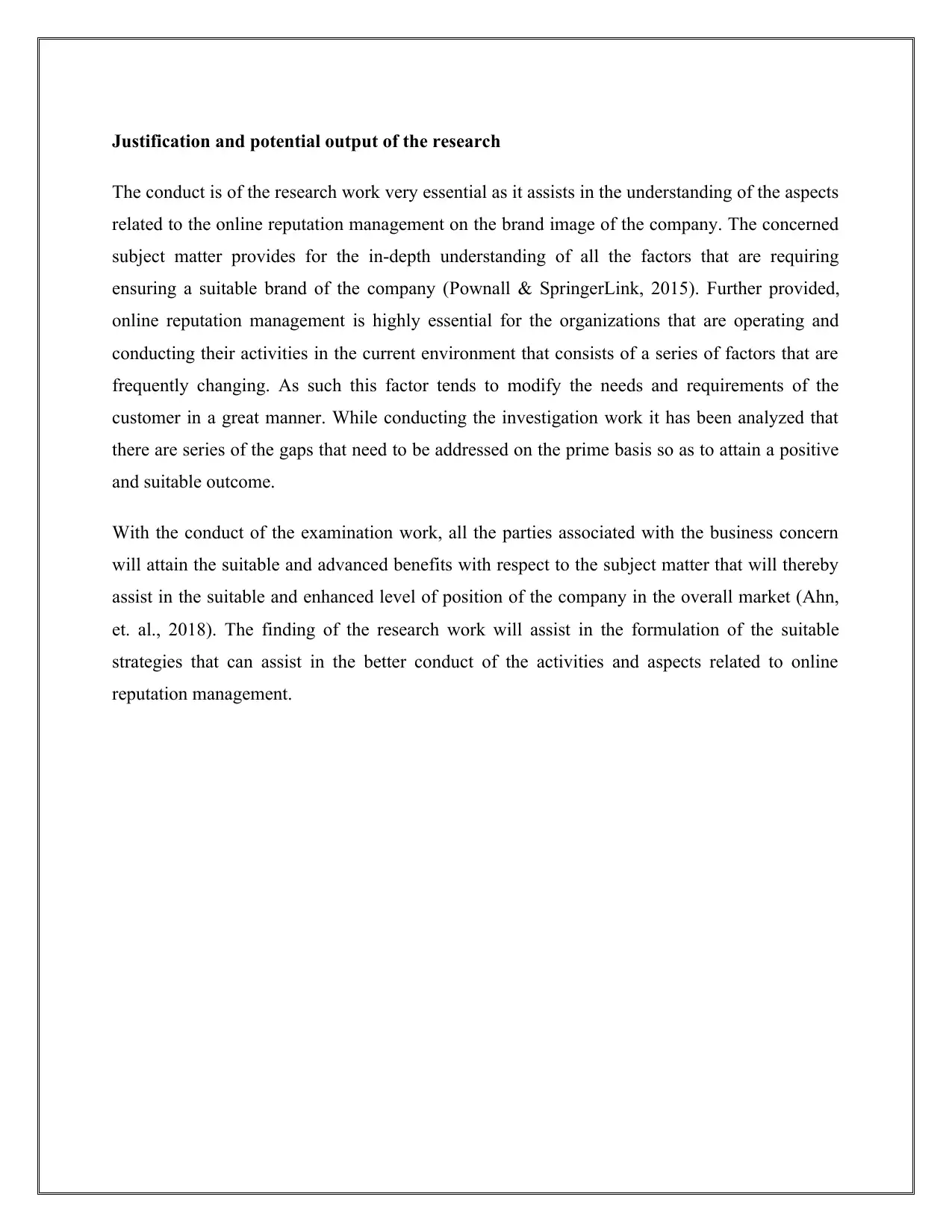
Justification and potential output of the research
The conduct is of the research work very essential as it assists in the understanding of the aspects
related to the online reputation management on the brand image of the company. The concerned
subject matter provides for the in-depth understanding of all the factors that are requiring
ensuring a suitable brand of the company (Pownall & SpringerLink, 2015). Further provided,
online reputation management is highly essential for the organizations that are operating and
conducting their activities in the current environment that consists of a series of factors that are
frequently changing. As such this factor tends to modify the needs and requirements of the
customer in a great manner. While conducting the investigation work it has been analyzed that
there are series of the gaps that need to be addressed on the prime basis so as to attain a positive
and suitable outcome.
With the conduct of the examination work, all the parties associated with the business concern
will attain the suitable and advanced benefits with respect to the subject matter that will thereby
assist in the suitable and enhanced level of position of the company in the overall market (Ahn,
et. al., 2018). The finding of the research work will assist in the formulation of the suitable
strategies that can assist in the better conduct of the activities and aspects related to online
reputation management.
The conduct is of the research work very essential as it assists in the understanding of the aspects
related to the online reputation management on the brand image of the company. The concerned
subject matter provides for the in-depth understanding of all the factors that are requiring
ensuring a suitable brand of the company (Pownall & SpringerLink, 2015). Further provided,
online reputation management is highly essential for the organizations that are operating and
conducting their activities in the current environment that consists of a series of factors that are
frequently changing. As such this factor tends to modify the needs and requirements of the
customer in a great manner. While conducting the investigation work it has been analyzed that
there are series of the gaps that need to be addressed on the prime basis so as to attain a positive
and suitable outcome.
With the conduct of the examination work, all the parties associated with the business concern
will attain the suitable and advanced benefits with respect to the subject matter that will thereby
assist in the suitable and enhanced level of position of the company in the overall market (Ahn,
et. al., 2018). The finding of the research work will assist in the formulation of the suitable
strategies that can assist in the better conduct of the activities and aspects related to online
reputation management.
⊘ This is a preview!⊘
Do you want full access?
Subscribe today to unlock all pages.

Trusted by 1+ million students worldwide
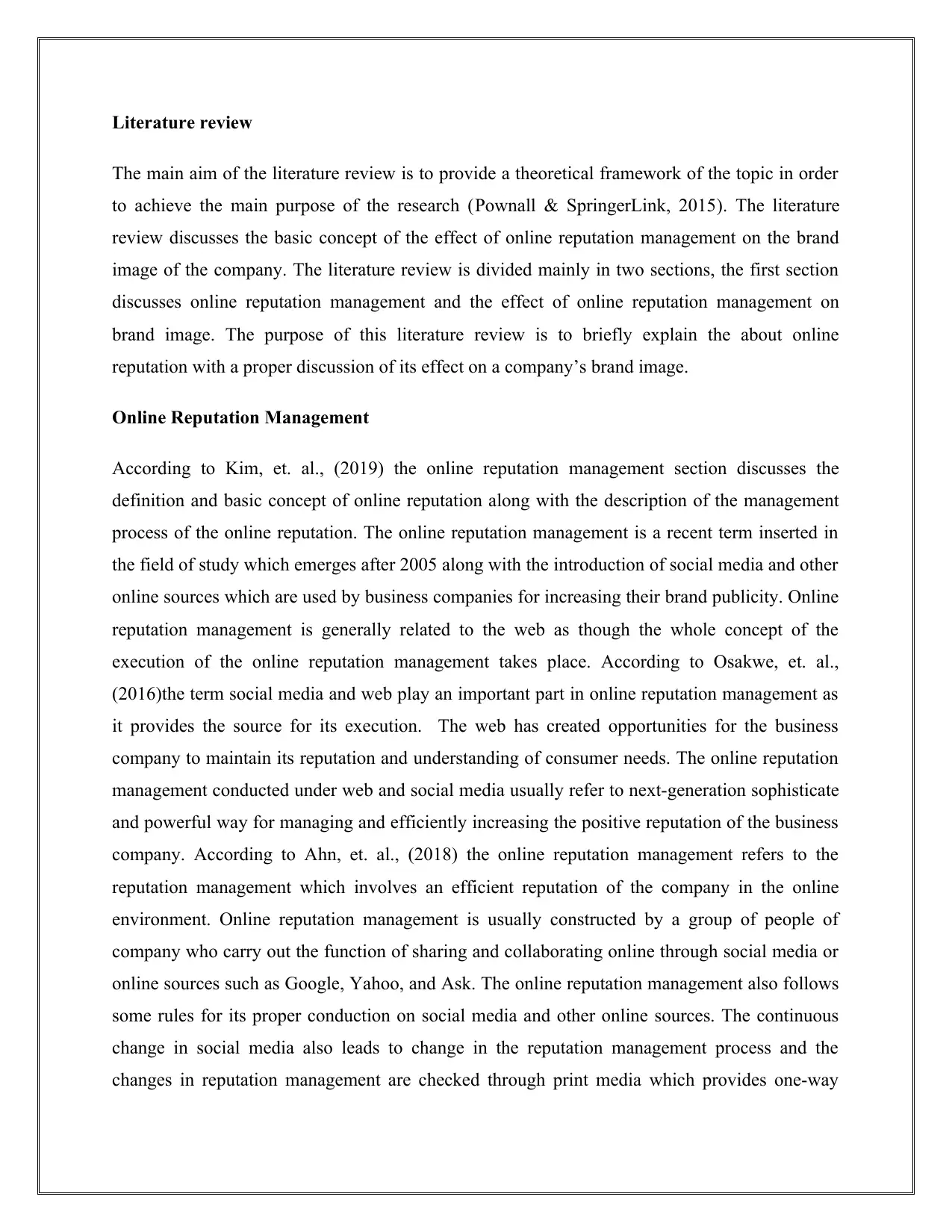
Literature review
The main aim of the literature review is to provide a theoretical framework of the topic in order
to achieve the main purpose of the research (Pownall & SpringerLink, 2015). The literature
review discusses the basic concept of the effect of online reputation management on the brand
image of the company. The literature review is divided mainly in two sections, the first section
discusses online reputation management and the effect of online reputation management on
brand image. The purpose of this literature review is to briefly explain the about online
reputation with a proper discussion of its effect on a company’s brand image.
Online Reputation Management
According to Kim, et. al., (2019) the online reputation management section discusses the
definition and basic concept of online reputation along with the description of the management
process of the online reputation. The online reputation management is a recent term inserted in
the field of study which emerges after 2005 along with the introduction of social media and other
online sources which are used by business companies for increasing their brand publicity. Online
reputation management is generally related to the web as though the whole concept of the
execution of the online reputation management takes place. According to Osakwe, et. al.,
(2016)the term social media and web play an important part in online reputation management as
it provides the source for its execution. The web has created opportunities for the business
company to maintain its reputation and understanding of consumer needs. The online reputation
management conducted under web and social media usually refer to next-generation sophisticate
and powerful way for managing and efficiently increasing the positive reputation of the business
company. According to Ahn, et. al., (2018) the online reputation management refers to the
reputation management which involves an efficient reputation of the company in the online
environment. Online reputation management is usually constructed by a group of people of
company who carry out the function of sharing and collaborating online through social media or
online sources such as Google, Yahoo, and Ask. The online reputation management also follows
some rules for its proper conduction on social media and other online sources. The continuous
change in social media also leads to change in the reputation management process and the
changes in reputation management are checked through print media which provides one-way
The main aim of the literature review is to provide a theoretical framework of the topic in order
to achieve the main purpose of the research (Pownall & SpringerLink, 2015). The literature
review discusses the basic concept of the effect of online reputation management on the brand
image of the company. The literature review is divided mainly in two sections, the first section
discusses online reputation management and the effect of online reputation management on
brand image. The purpose of this literature review is to briefly explain the about online
reputation with a proper discussion of its effect on a company’s brand image.
Online Reputation Management
According to Kim, et. al., (2019) the online reputation management section discusses the
definition and basic concept of online reputation along with the description of the management
process of the online reputation. The online reputation management is a recent term inserted in
the field of study which emerges after 2005 along with the introduction of social media and other
online sources which are used by business companies for increasing their brand publicity. Online
reputation management is generally related to the web as though the whole concept of the
execution of the online reputation management takes place. According to Osakwe, et. al.,
(2016)the term social media and web play an important part in online reputation management as
it provides the source for its execution. The web has created opportunities for the business
company to maintain its reputation and understanding of consumer needs. The online reputation
management conducted under web and social media usually refer to next-generation sophisticate
and powerful way for managing and efficiently increasing the positive reputation of the business
company. According to Ahn, et. al., (2018) the online reputation management refers to the
reputation management which involves an efficient reputation of the company in the online
environment. Online reputation management is usually constructed by a group of people of
company who carry out the function of sharing and collaborating online through social media or
online sources such as Google, Yahoo, and Ask. The online reputation management also follows
some rules for its proper conduction on social media and other online sources. The continuous
change in social media also leads to change in the reputation management process and the
changes in reputation management are checked through print media which provides one-way
Paraphrase This Document
Need a fresh take? Get an instant paraphrase of this document with our AI Paraphraser
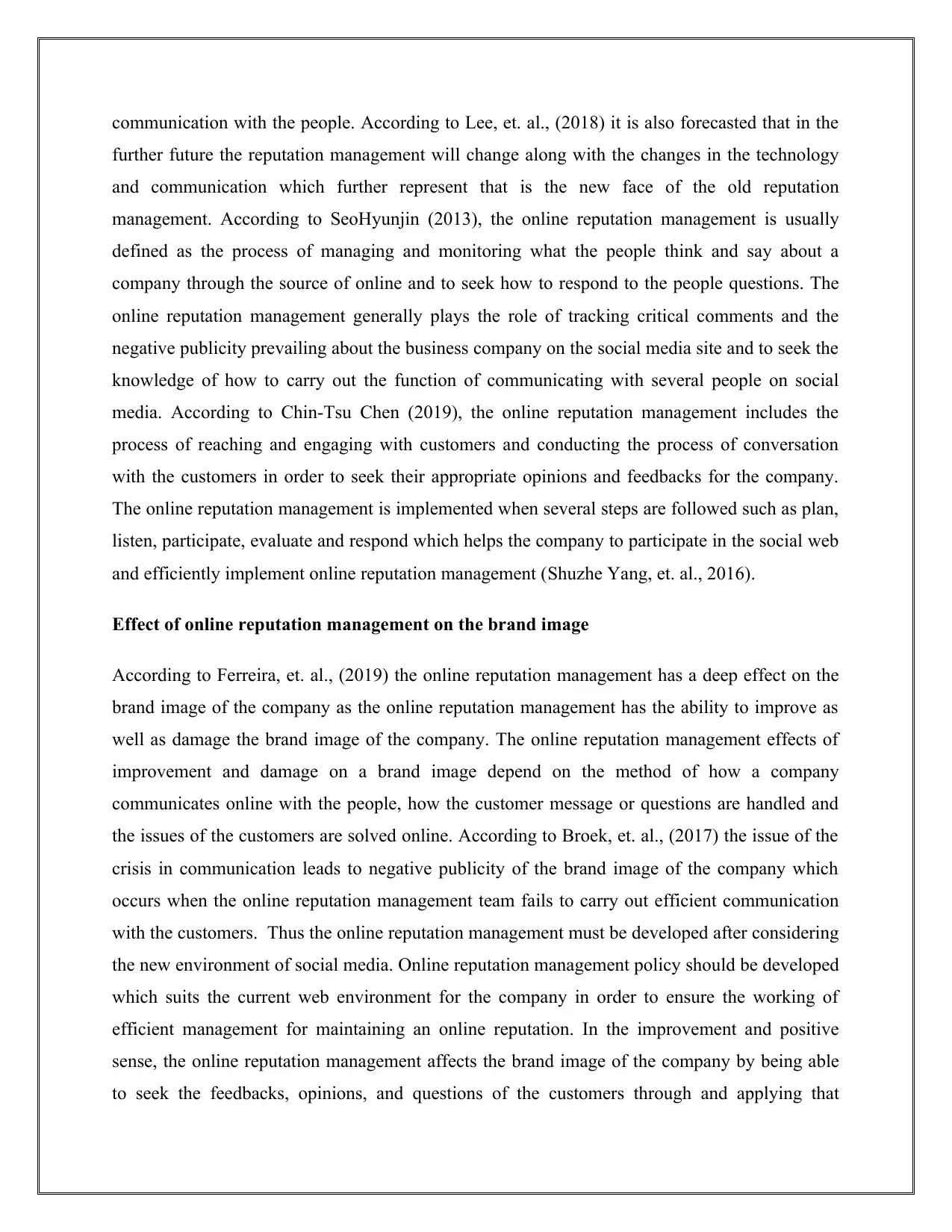
communication with the people. According to Lee, et. al., (2018) it is also forecasted that in the
further future the reputation management will change along with the changes in the technology
and communication which further represent that is the new face of the old reputation
management. According to SeoHyunjin (2013), the online reputation management is usually
defined as the process of managing and monitoring what the people think and say about a
company through the source of online and to seek how to respond to the people questions. The
online reputation management generally plays the role of tracking critical comments and the
negative publicity prevailing about the business company on the social media site and to seek the
knowledge of how to carry out the function of communicating with several people on social
media. According to Chin-Tsu Chen (2019), the online reputation management includes the
process of reaching and engaging with customers and conducting the process of conversation
with the customers in order to seek their appropriate opinions and feedbacks for the company.
The online reputation management is implemented when several steps are followed such as plan,
listen, participate, evaluate and respond which helps the company to participate in the social web
and efficiently implement online reputation management (Shuzhe Yang, et. al., 2016).
Effect of online reputation management on the brand image
According to Ferreira, et. al., (2019) the online reputation management has a deep effect on the
brand image of the company as the online reputation management has the ability to improve as
well as damage the brand image of the company. The online reputation management effects of
improvement and damage on a brand image depend on the method of how a company
communicates online with the people, how the customer message or questions are handled and
the issues of the customers are solved online. According to Broek, et. al., (2017) the issue of the
crisis in communication leads to negative publicity of the brand image of the company which
occurs when the online reputation management team fails to carry out efficient communication
with the customers. Thus the online reputation management must be developed after considering
the new environment of social media. Online reputation management policy should be developed
which suits the current web environment for the company in order to ensure the working of
efficient management for maintaining an online reputation. In the improvement and positive
sense, the online reputation management affects the brand image of the company by being able
to seek the feedbacks, opinions, and questions of the customers through and applying that
further future the reputation management will change along with the changes in the technology
and communication which further represent that is the new face of the old reputation
management. According to SeoHyunjin (2013), the online reputation management is usually
defined as the process of managing and monitoring what the people think and say about a
company through the source of online and to seek how to respond to the people questions. The
online reputation management generally plays the role of tracking critical comments and the
negative publicity prevailing about the business company on the social media site and to seek the
knowledge of how to carry out the function of communicating with several people on social
media. According to Chin-Tsu Chen (2019), the online reputation management includes the
process of reaching and engaging with customers and conducting the process of conversation
with the customers in order to seek their appropriate opinions and feedbacks for the company.
The online reputation management is implemented when several steps are followed such as plan,
listen, participate, evaluate and respond which helps the company to participate in the social web
and efficiently implement online reputation management (Shuzhe Yang, et. al., 2016).
Effect of online reputation management on the brand image
According to Ferreira, et. al., (2019) the online reputation management has a deep effect on the
brand image of the company as the online reputation management has the ability to improve as
well as damage the brand image of the company. The online reputation management effects of
improvement and damage on a brand image depend on the method of how a company
communicates online with the people, how the customer message or questions are handled and
the issues of the customers are solved online. According to Broek, et. al., (2017) the issue of the
crisis in communication leads to negative publicity of the brand image of the company which
occurs when the online reputation management team fails to carry out efficient communication
with the customers. Thus the online reputation management must be developed after considering
the new environment of social media. Online reputation management policy should be developed
which suits the current web environment for the company in order to ensure the working of
efficient management for maintaining an online reputation. In the improvement and positive
sense, the online reputation management affects the brand image of the company by being able
to seek the feedbacks, opinions, and questions of the customers through and applying that
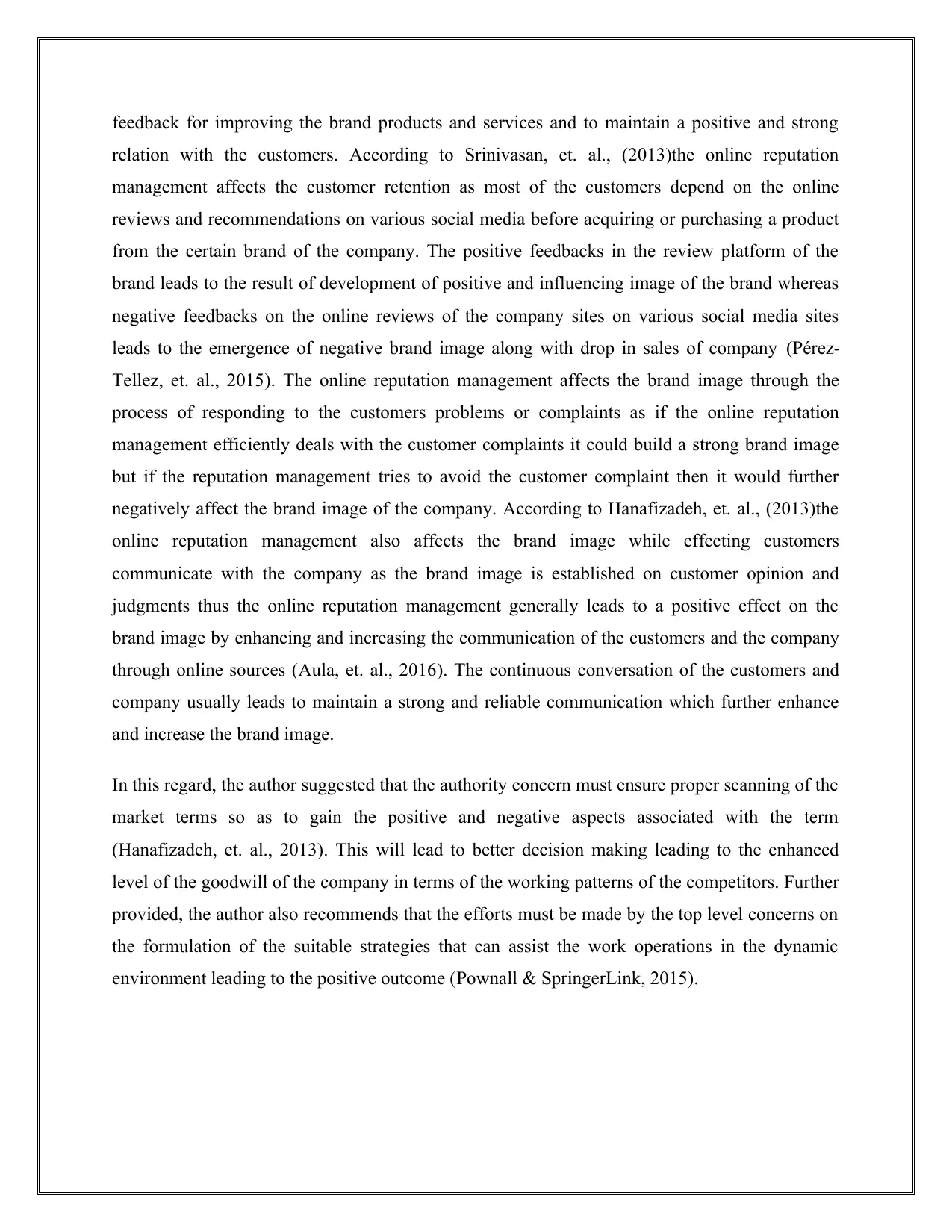
feedback for improving the brand products and services and to maintain a positive and strong
relation with the customers. According to Srinivasan, et. al., (2013)the online reputation
management affects the customer retention as most of the customers depend on the online
reviews and recommendations on various social media before acquiring or purchasing a product
from the certain brand of the company. The positive feedbacks in the review platform of the
brand leads to the result of development of positive and influencing image of the brand whereas
negative feedbacks on the online reviews of the company sites on various social media sites
leads to the emergence of negative brand image along with drop in sales of company (Pérez-
Tellez, et. al., 2015). The online reputation management affects the brand image through the
process of responding to the customers problems or complaints as if the online reputation
management efficiently deals with the customer complaints it could build a strong brand image
but if the reputation management tries to avoid the customer complaint then it would further
negatively affect the brand image of the company. According to Hanafizadeh, et. al., (2013)the
online reputation management also affects the brand image while effecting customers
communicate with the company as the brand image is established on customer opinion and
judgments thus the online reputation management generally leads to a positive effect on the
brand image by enhancing and increasing the communication of the customers and the company
through online sources (Aula, et. al., 2016). The continuous conversation of the customers and
company usually leads to maintain a strong and reliable communication which further enhance
and increase the brand image.
In this regard, the author suggested that the authority concern must ensure proper scanning of the
market terms so as to gain the positive and negative aspects associated with the term
(Hanafizadeh, et. al., 2013). This will lead to better decision making leading to the enhanced
level of the goodwill of the company in terms of the working patterns of the competitors. Further
provided, the author also recommends that the efforts must be made by the top level concerns on
the formulation of the suitable strategies that can assist the work operations in the dynamic
environment leading to the positive outcome (Pownall & SpringerLink, 2015).
relation with the customers. According to Srinivasan, et. al., (2013)the online reputation
management affects the customer retention as most of the customers depend on the online
reviews and recommendations on various social media before acquiring or purchasing a product
from the certain brand of the company. The positive feedbacks in the review platform of the
brand leads to the result of development of positive and influencing image of the brand whereas
negative feedbacks on the online reviews of the company sites on various social media sites
leads to the emergence of negative brand image along with drop in sales of company (Pérez-
Tellez, et. al., 2015). The online reputation management affects the brand image through the
process of responding to the customers problems or complaints as if the online reputation
management efficiently deals with the customer complaints it could build a strong brand image
but if the reputation management tries to avoid the customer complaint then it would further
negatively affect the brand image of the company. According to Hanafizadeh, et. al., (2013)the
online reputation management also affects the brand image while effecting customers
communicate with the company as the brand image is established on customer opinion and
judgments thus the online reputation management generally leads to a positive effect on the
brand image by enhancing and increasing the communication of the customers and the company
through online sources (Aula, et. al., 2016). The continuous conversation of the customers and
company usually leads to maintain a strong and reliable communication which further enhance
and increase the brand image.
In this regard, the author suggested that the authority concern must ensure proper scanning of the
market terms so as to gain the positive and negative aspects associated with the term
(Hanafizadeh, et. al., 2013). This will lead to better decision making leading to the enhanced
level of the goodwill of the company in terms of the working patterns of the competitors. Further
provided, the author also recommends that the efforts must be made by the top level concerns on
the formulation of the suitable strategies that can assist the work operations in the dynamic
environment leading to the positive outcome (Pownall & SpringerLink, 2015).
⊘ This is a preview!⊘
Do you want full access?
Subscribe today to unlock all pages.

Trusted by 1+ million students worldwide
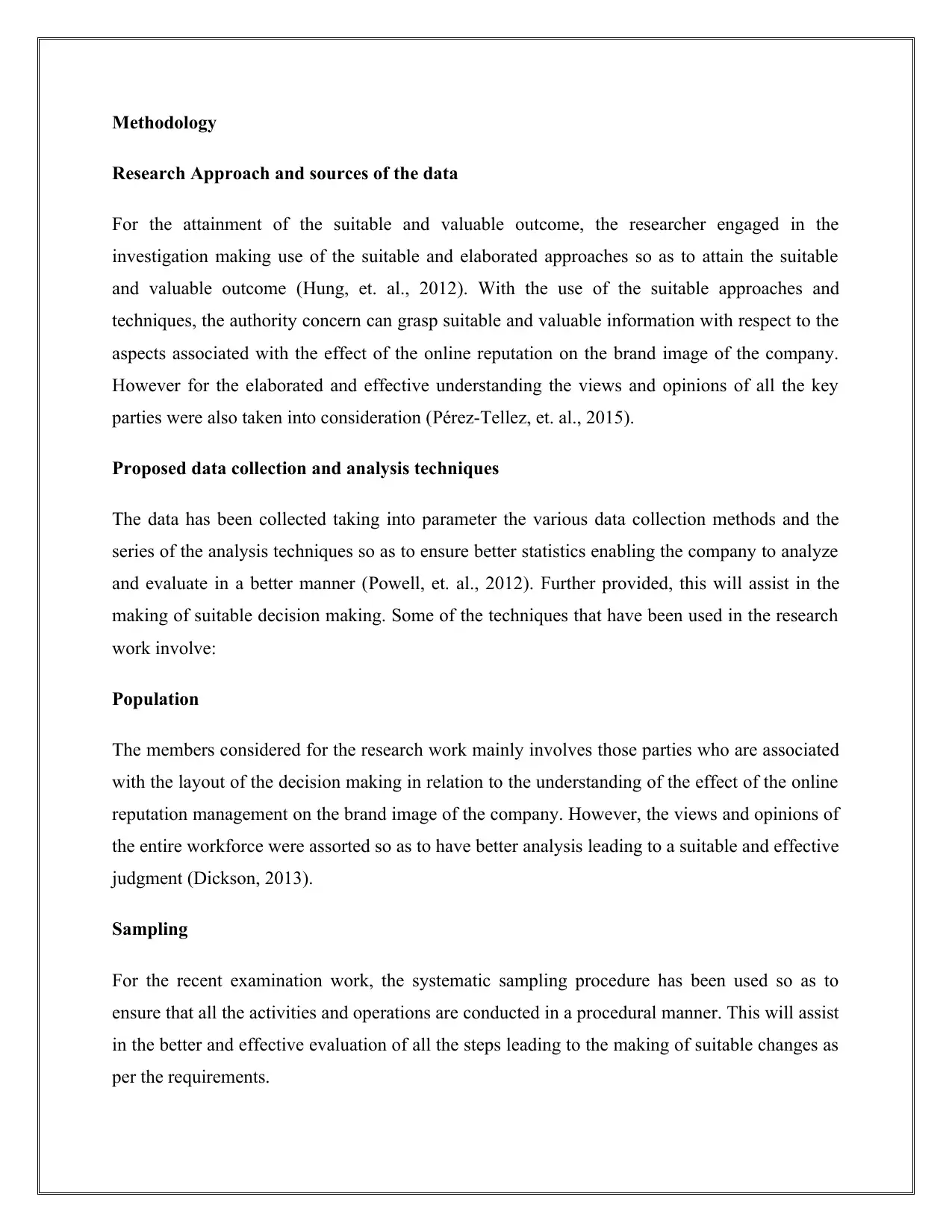
Methodology
Research Approach and sources of the data
For the attainment of the suitable and valuable outcome, the researcher engaged in the
investigation making use of the suitable and elaborated approaches so as to attain the suitable
and valuable outcome (Hung, et. al., 2012). With the use of the suitable approaches and
techniques, the authority concern can grasp suitable and valuable information with respect to the
aspects associated with the effect of the online reputation on the brand image of the company.
However for the elaborated and effective understanding the views and opinions of all the key
parties were also taken into consideration (Pérez-Tellez, et. al., 2015).
Proposed data collection and analysis techniques
The data has been collected taking into parameter the various data collection methods and the
series of the analysis techniques so as to ensure better statistics enabling the company to analyze
and evaluate in a better manner (Powell, et. al., 2012). Further provided, this will assist in the
making of suitable decision making. Some of the techniques that have been used in the research
work involve:
Population
The members considered for the research work mainly involves those parties who are associated
with the layout of the decision making in relation to the understanding of the effect of the online
reputation management on the brand image of the company. However, the views and opinions of
the entire workforce were assorted so as to have better analysis leading to a suitable and effective
judgment (Dickson, 2013).
Sampling
For the recent examination work, the systematic sampling procedure has been used so as to
ensure that all the activities and operations are conducted in a procedural manner. This will assist
in the better and effective evaluation of all the steps leading to the making of suitable changes as
per the requirements.
Research Approach and sources of the data
For the attainment of the suitable and valuable outcome, the researcher engaged in the
investigation making use of the suitable and elaborated approaches so as to attain the suitable
and valuable outcome (Hung, et. al., 2012). With the use of the suitable approaches and
techniques, the authority concern can grasp suitable and valuable information with respect to the
aspects associated with the effect of the online reputation on the brand image of the company.
However for the elaborated and effective understanding the views and opinions of all the key
parties were also taken into consideration (Pérez-Tellez, et. al., 2015).
Proposed data collection and analysis techniques
The data has been collected taking into parameter the various data collection methods and the
series of the analysis techniques so as to ensure better statistics enabling the company to analyze
and evaluate in a better manner (Powell, et. al., 2012). Further provided, this will assist in the
making of suitable decision making. Some of the techniques that have been used in the research
work involve:
Population
The members considered for the research work mainly involves those parties who are associated
with the layout of the decision making in relation to the understanding of the effect of the online
reputation management on the brand image of the company. However, the views and opinions of
the entire workforce were assorted so as to have better analysis leading to a suitable and effective
judgment (Dickson, 2013).
Sampling
For the recent examination work, the systematic sampling procedure has been used so as to
ensure that all the activities and operations are conducted in a procedural manner. This will assist
in the better and effective evaluation of all the steps leading to the making of suitable changes as
per the requirements.
Paraphrase This Document
Need a fresh take? Get an instant paraphrase of this document with our AI Paraphraser
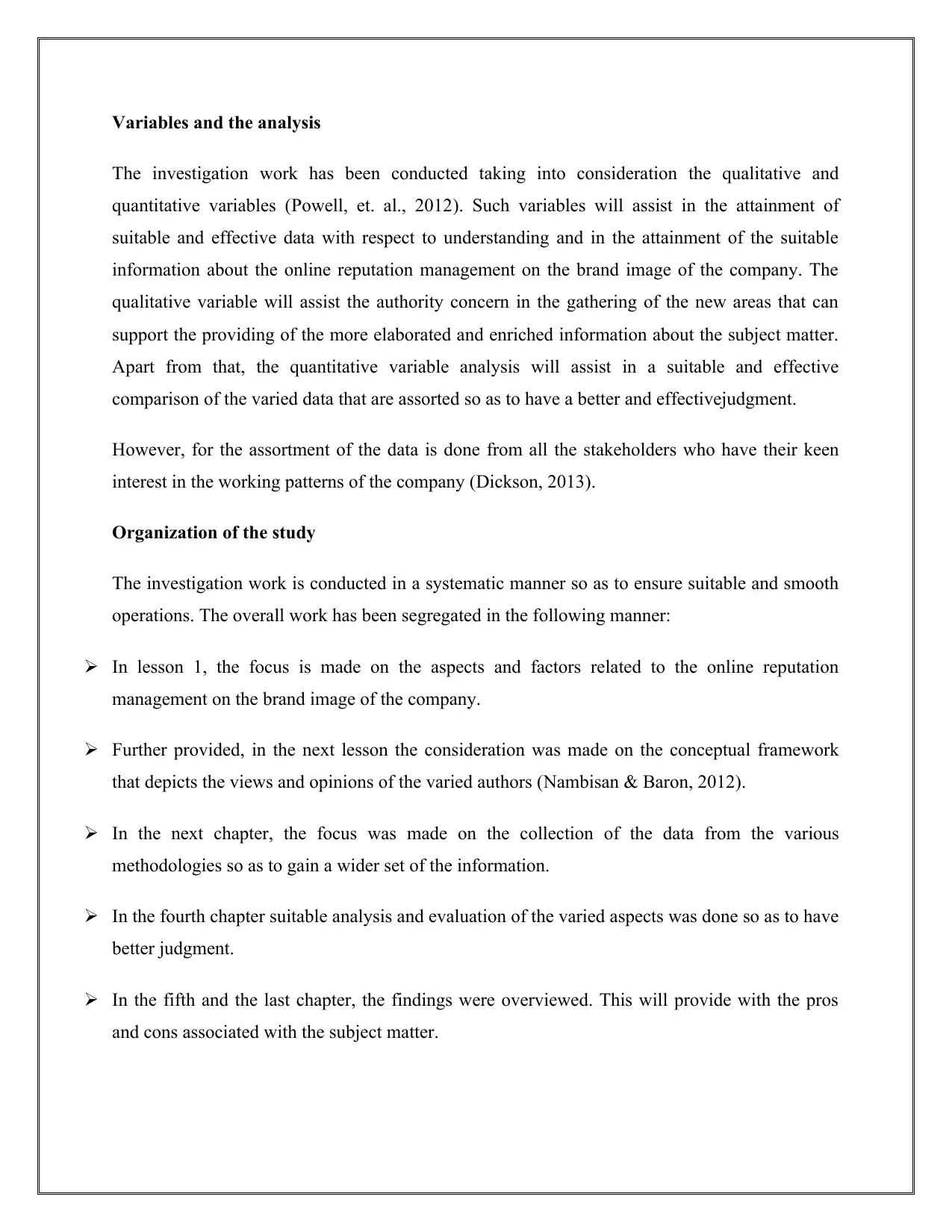
Variables and the analysis
The investigation work has been conducted taking into consideration the qualitative and
quantitative variables (Powell, et. al., 2012). Such variables will assist in the attainment of
suitable and effective data with respect to understanding and in the attainment of the suitable
information about the online reputation management on the brand image of the company. The
qualitative variable will assist the authority concern in the gathering of the new areas that can
support the providing of the more elaborated and enriched information about the subject matter.
Apart from that, the quantitative variable analysis will assist in a suitable and effective
comparison of the varied data that are assorted so as to have a better and effectivejudgment.
However, for the assortment of the data is done from all the stakeholders who have their keen
interest in the working patterns of the company (Dickson, 2013).
Organization of the study
The investigation work is conducted in a systematic manner so as to ensure suitable and smooth
operations. The overall work has been segregated in the following manner:
In lesson 1, the focus is made on the aspects and factors related to the online reputation
management on the brand image of the company.
Further provided, in the next lesson the consideration was made on the conceptual framework
that depicts the views and opinions of the varied authors (Nambisan & Baron, 2012).
In the next chapter, the focus was made on the collection of the data from the various
methodologies so as to gain a wider set of the information.
In the fourth chapter suitable analysis and evaluation of the varied aspects was done so as to have
better judgment.
In the fifth and the last chapter, the findings were overviewed. This will provide with the pros
and cons associated with the subject matter.
The investigation work has been conducted taking into consideration the qualitative and
quantitative variables (Powell, et. al., 2012). Such variables will assist in the attainment of
suitable and effective data with respect to understanding and in the attainment of the suitable
information about the online reputation management on the brand image of the company. The
qualitative variable will assist the authority concern in the gathering of the new areas that can
support the providing of the more elaborated and enriched information about the subject matter.
Apart from that, the quantitative variable analysis will assist in a suitable and effective
comparison of the varied data that are assorted so as to have a better and effectivejudgment.
However, for the assortment of the data is done from all the stakeholders who have their keen
interest in the working patterns of the company (Dickson, 2013).
Organization of the study
The investigation work is conducted in a systematic manner so as to ensure suitable and smooth
operations. The overall work has been segregated in the following manner:
In lesson 1, the focus is made on the aspects and factors related to the online reputation
management on the brand image of the company.
Further provided, in the next lesson the consideration was made on the conceptual framework
that depicts the views and opinions of the varied authors (Nambisan & Baron, 2012).
In the next chapter, the focus was made on the collection of the data from the various
methodologies so as to gain a wider set of the information.
In the fourth chapter suitable analysis and evaluation of the varied aspects was done so as to have
better judgment.
In the fifth and the last chapter, the findings were overviewed. This will provide with the pros
and cons associated with the subject matter.
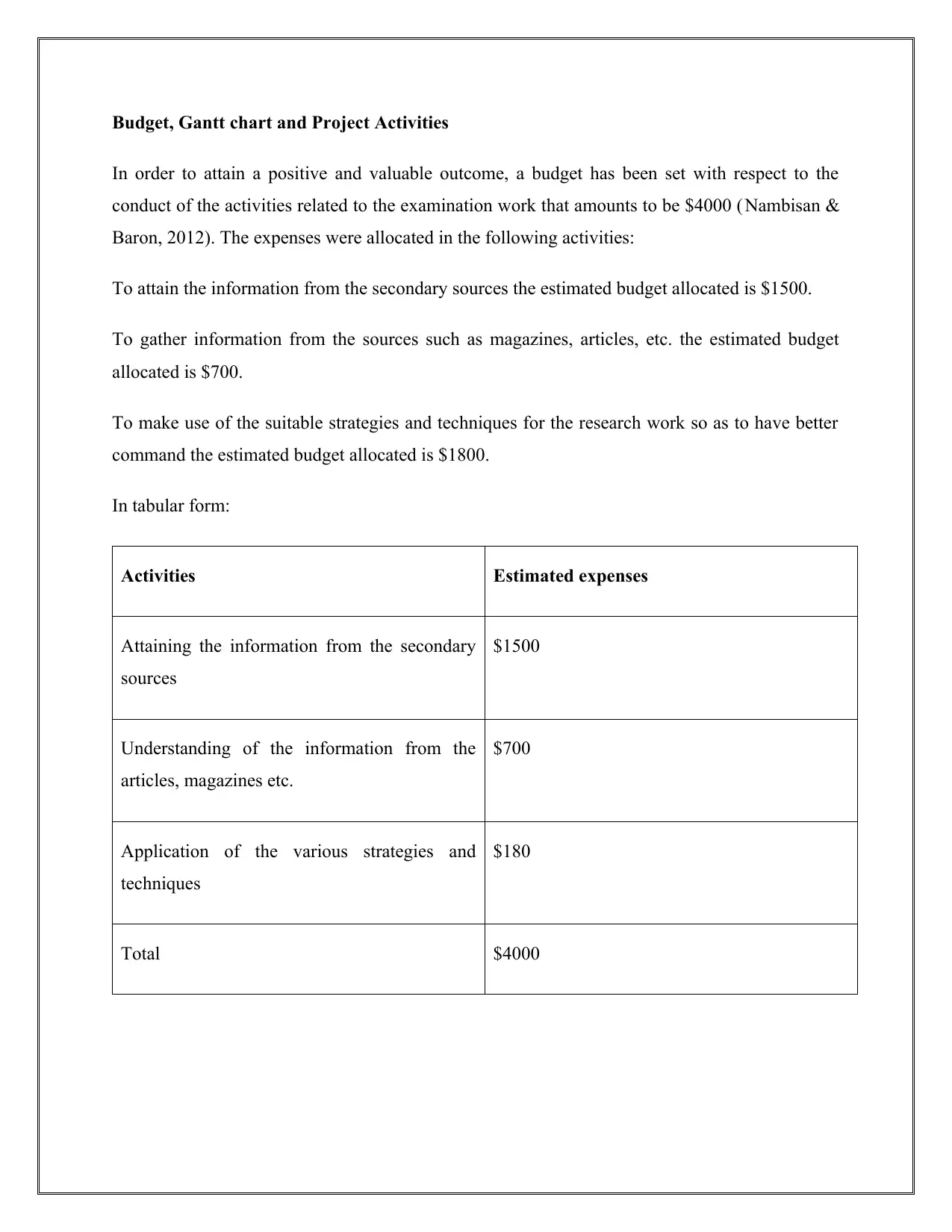
Budget, Gantt chart and Project Activities
In order to attain a positive and valuable outcome, a budget has been set with respect to the
conduct of the activities related to the examination work that amounts to be $4000 (Nambisan &
Baron, 2012). The expenses were allocated in the following activities:
To attain the information from the secondary sources the estimated budget allocated is $1500.
To gather information from the sources such as magazines, articles, etc. the estimated budget
allocated is $700.
To make use of the suitable strategies and techniques for the research work so as to have better
command the estimated budget allocated is $1800.
In tabular form:
Activities Estimated expenses
Attaining the information from the secondary
sources
$1500
Understanding of the information from the
articles, magazines etc.
$700
Application of the various strategies and
techniques
$180
Total $4000
In order to attain a positive and valuable outcome, a budget has been set with respect to the
conduct of the activities related to the examination work that amounts to be $4000 (Nambisan &
Baron, 2012). The expenses were allocated in the following activities:
To attain the information from the secondary sources the estimated budget allocated is $1500.
To gather information from the sources such as magazines, articles, etc. the estimated budget
allocated is $700.
To make use of the suitable strategies and techniques for the research work so as to have better
command the estimated budget allocated is $1800.
In tabular form:
Activities Estimated expenses
Attaining the information from the secondary
sources
$1500
Understanding of the information from the
articles, magazines etc.
$700
Application of the various strategies and
techniques
$180
Total $4000
⊘ This is a preview!⊘
Do you want full access?
Subscribe today to unlock all pages.

Trusted by 1+ million students worldwide
1 out of 20
Related Documents
Your All-in-One AI-Powered Toolkit for Academic Success.
+13062052269
info@desklib.com
Available 24*7 on WhatsApp / Email
![[object Object]](/_next/static/media/star-bottom.7253800d.svg)
Unlock your academic potential
Copyright © 2020–2026 A2Z Services. All Rights Reserved. Developed and managed by ZUCOL.